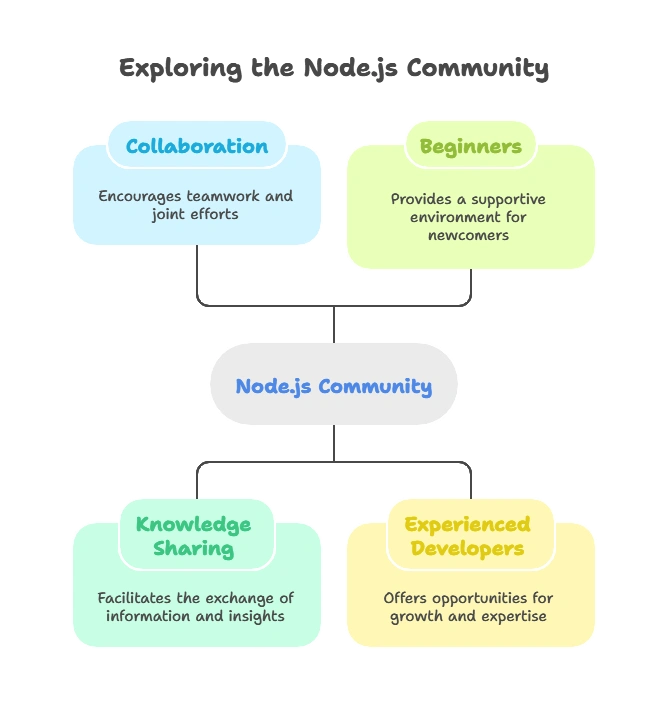Node.js Community and Resources
The Node.js community is a vibrant, supportive network of developers, contributors, and enthusiasts worldwide.
Introduction to the Node.js Community
The Node.js community is a global network that encourages collaboration and knowledge sharing. Joining this community is invaluable for beginners and experienced developers alike.

Official Node.js Resources
Node.js has a well-established set of official resources that provide the foundation for understanding and working with the technology.
Node.js Documentation
The Node.js Documentation is the most comprehensive resource available. It covers:
- API Documentation: Details on each module in Node.js, including usage examples.
- Guides: Topics like installing Node.js, debugging, performance tuning, and best practices.
- Release Notes: Information on new releases, changes, and deprecations.
Example:
To find information about the http module, visit the API documentation, where you can look up methods like http.createServer().
Node.js GitHub Repository
The Node.js GitHub Repository is the central hub for the open-source project:
- Source Code: All Node.js source code is here, along with version history and release tags.
- Issues: Report bugs, suggest features, and discuss fixes.
- Pull Requests: Node.js contributors actively work here, which is an excellent place to learn how code evolves through collaboration.
Community Resources and Forums
There are many active communities where developers can ask questions, share knowledge, and find help for common (and uncommon) issues.
Stack Overflow
Stack Overflow has a large community of Node.js developers, with questions and answers on every conceivable Node.js topic. You can search by tags like node.js, express, or npm.
Example:
If you want to troubleshoot why a particular Node.js module is not installing, searching “Node.js module not installing” often brings up similar issues and solutions.
Reddit Communities
- r/node: The largest Node.js subreddit, discussing news, libraries, and programming help.
- r/javascript: Includes broader JavaScript topics, including Node.js.
Learning Resources
These resources provide structured learning for developers at any skill level.
Online Courses
- Udemy – Courses like The Complete Node.js Developer Course by Andrew Mead provide extensive, hands-on training.
- Coursera – Node.js, Express, and MongoDB by the University of London is another excellent course.
- Pluralsight – Offers both beginner and advanced courses in Node.js.
Books and eBooks
Books can be invaluable resources for in-depth learning. Notable titles include:
- Node.js Design Patterns by Mario Casciaro
- Eloquent JavaScript by Marijn Haverbeke (covers Node.js fundamentals)
YouTube Channels and Tutorials
YouTube offers quick and easy-to-follow tutorials. Recommended channels include:
- Traversy Media – Comprehensive, beginner-friendly Node.js tutorials.
- Academind – In-depth Node.js and JavaScript content.
Node.js Conferences and Events
Node.js has a strong event culture, providing developers a chance to learn, network, and collaborate.
NodeConf
One of the largest Node.js conferences, NodeConf covers the latest developments, tools, and best practices. Speakers include key Node.js contributors and industry experts.
JSConf
Though not Node.js-specific, JSConf is a highly respected JavaScript conference where many Node.js topics are covered.
Meetup Groups and Local Events
Platforms like Meetup.com and Eventbrite often list Node.js meetups in major cities, where developers can discuss topics, ask questions, and connect with peers.
Open-Source Contributions
Contributing to open-source projects is a valuable way to learn, gain experience, and build your portfolio.
Finding Projects on GitHub
GitHub has numerous Node.js projects, including:
- Express.js: One of the most popular Node.js web frameworks.
- Socket.IO: A library for real-time communication.
How to Contribute
To contribute:
- Fork the Repository: Creates a copy of the project in your GitHub account.
- Create a Branch: Work on a new feature or bug fix in a separate branch.
- Submit a Pull Request: Once done, submit a pull request (PR) for review.
Example:
If you want to contribute to the Express.js repository, start by checking out Express’s GitHub repository.
Staying Updated with Node.js
The Node.js ecosystem is continuously evolving, so staying up-to-date is essential.
Blogs and Newsletters
- Node.js Foundation Blog: Official news, updates, and announcements.
- JavaScript Weekly: A weekly email newsletter covering JavaScript and Node.js.
Social Media and Influencers
Many Node.js developers share insights, tutorials, and news on social media. Notable accounts include:
- @nodejs on Twitter
- @tjholowaychuk (TJ Holowaychuk), a prolific Node.js developer and creator of Express.js
Examples of Community Contributions
Community contributions include widely used frameworks, libraries, and even documentation improvements. Examples:
- Express.js: A community-created framework now essential in the Node.js ecosystem.
- Mocha: A popular testing framework.
- NPM Modules: Node.js package manager, which hosts thousands of open-source libraries contributed by the community.
These contributions not only expand Node.js capabilities but also demonstrate the collaborative power of the Node.js community.
The Node.js community is rich with resources, forums, and events that make learning and developing in Node.js a rewarding experience. Whether you're a beginner looking for answers, a developer seeking to stay updated, or an enthusiast eager to contribute, connecting with the Node.js community can significantly enhance your development journey. Happy Coding!❤️
